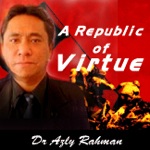Coloniser-colonised thesis revisited

That is what is happening now in the streets of Tunis; the coloniser who was once a colonised mind has turned into a coloniser and now is deposed by the colonised. Revolt is the way to overcome the slow death of the masses via hegemony of developmentalism and the illusion of nationalism.
A Republic of Virtue
By Dr. Azly Rahman
Learning about the current Tunisian revolt, and remembering the work of Martin Luther King Jr, I have somewhat come to draw a parallel between analysis and hope, between reality and manifestation. From Albert Memmi to Martin Luther King Jr.
In the case of the Tunisian youth ‘chasing out’ their dictator of 23 years and their anger over the royal robbery of the monarch, I found an explanation in the 1965 classic by the Tunisian psychoanalyst and political-cultural theorist Albert Memmi in his seminal work, The Colonizer and the Colonized, in which he proposed that the only way to resolve the contradiction of the oppressor and the oppressed and put an end to the brutality of the dictator is through revolt.
One can find a similar theme in analysing the master-slave narrative in works such as Frantz Fanon’s The Wretched of the Earth and Paulo Freire’s Pedagogy of the Oppressed.
That is what is happening now in the streets of Tunis; the coloniser who was once a colonised mind has turned into a coloniser and now is deposed by the colonised. Revolt is the way to overcome the slow death of the masses via hegemony of developmentalism and the illusion of nationalism.
That was the path Algerians took in the Battle of Algiers, in which the colonised fought against the brutal French colonisers, ending in a few million deaths.Obama’s election a symbolic victory of the enslaved
In the case of the United States, the colonised were the African-Americans who had a unique history of being forced into slavery by the colonisers, with the struggle for freedom culminating in the civil rights movement of King and Malcolm X, among others, and today, triumphantly culminating in a symbolic victory of the enslaved or the colonised in the person of Barack Obama as the first African-American president: a peaceful revolt American-styled, nonetheless.
King’s hope was realised, his dream came through beyond that of merely seeing white and black children walking together to school, holding hands.
I am proposing that social scientists analyse the phenomena of the deposition of monarchs and dictators, using what I call “radical semiotics”; a method of deconstructionism that not only analyses the historical materiality of royal symbolism, but also the mythical origins of the need to colonise, and how these human figures of ruler-ship became enshrined in the mind of the colonised as the symbol of unquestioning loyalty, even in the post post-enlightenment age of cosmopolitan democracy and cybernetics.
Capitalism, exciting as an ideology to promote free spiritedness but uninteresting as a system that can curb human greed and the nurturing of the coloniser-colonised culture, works hand in hand with the symbolism and habitues of power.
In the case of the feudal lords, the church and other houses of worship might give the spiritual inspiration or the religious raison d’etre to legitimise and authorise the advancement and institutionalisation of greed.
Throughout history, monarchs who work hand in hand with aristocrats and powerful merchant houses provide not only the avenue for the rich to amass as much as they can through the ideology of guns-guts-glory, but also a soothing and serenading sermon for the poor to wait for the kingdom of god to come, and be poor and happy and believe in the divine rights of kings so that the kingdom can be stable enough for the poor to keep praying for the gratitude of being poor and for the rich to hand them charities.
Into the religious texts too are sometimes woven this ideology of being happy with the wealth of spirituality, with the poverty of materialism inscribed to legitimise the institutionalisation of capitalism.
As a response to this priestly-class influence of religion on the affairs of the homo economicus, we saw the birth of the liberation theology and the art of destroying symbolism; of iconoclasm.
The death of daulat. The death of the divine rights of kings. The realisation of the hidden dollar and dinar sign in every symbol of the royalty – ala the third eye of the Illuminati.
In essence, Albert Memmi’s thesis on the narrative of mental colonisation is now seen on the streets and we need a new understanding of semiotics to understand this world of perpetual revolutions.
OUR USUAL REMINDER, FOLKS:
While the opinion in the article is mine,
the comments are yours;
present them rationally and ethically.
AND — ABOLISH THE ISA — NOW!
facebook: http://www.facebook.com/#!/profile.php?id=689079971
blog: http://azlyrahman-illuminations.blogspot.com/

